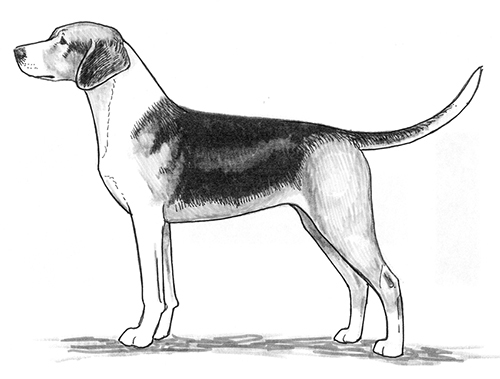Deutsche Bracke
Scenthound Group
The goals and purposes of this breed standard include: to furnish guidelines for breeders who wish to maintain the quality of their breed and to improve it; to advance this breed to a state of similarity throughout the world; and to act as a guide for judges.
Breeders and judges have the responsibility to avoid any conditions or exaggerations that are detrimental to the health, welfare, essence and soundness of this breed, and must take the responsibility to see that these are not perpetuated.
Any departure from the following should be considered a fault, and the seriousness with which the fault should be regarded should be in exact proportion to its degree and its effect upon the health and welfare of the dog and on the dog’s ability to perform its traditional work.
History
From the many varieties of Bracken that originally existed, only one survived in Germany, the Westphalian Bracke. These were interbred with local Steinbracken, and one type evolved, which has been known since 1900 as the Deutsche Bracke, or German Bracke Hound.
The Duetsche Bracke was recognized by the United Kennel Club January 1, 1996.
General Appearance
A light, high stationed, elegant yet strongly made hunting dog with a noble appearance.
Head
Fine, clean and long, with flat cheeks.
Fault: Teckel-like head shape.
SKULL
The skull is slightly domed, and the occiput is not prominent. The stop is minimal.
MUZZLE
The bridge of the nose is very slightly convex. The lips are moderately pendant.
TEETH
The Duetsche Bracke has a complete set of evenly spaced, white teeth meeting in a scissors or level bite.
NOSE
The nose has a light, almost pink, strip in its center. The rest of the nose is dark.
EYES
The eyes are dark and clear, with a friendly expression.
EARS
The ears are long and broad, close fitting, and rounded at the ends.
Neck
The neck is moderately long, and strong in relation to the head.
Forequarters
The shoulders are clean, and the withers are high.
FORELEGS
The legs are lean, fine boned and sinewy, with close elbows.
Body
The chest is deep, reaching below the elbow. The ribcage is long. The back is slightly arched, and the croup falls away slightly.
Fault: Long and low body shape.
Hindquarters
HIND LEGS
The upper thighs are broad and full in profile. The lower thigh is long, not very broad, and well angulated.
Feet
Longer than cat feet, with very tight toes.
Tail
Long, and not noticeably strong at the root. The tail has bushy long hair, and therefore appears heavy, yet it tapers to a point. It is carried down or upward in a curve.
Fault: Ring tail.
Coat
Dense, hard and bristly. Long, for a short haired dog. There is a brush on the tail and there are breeches on the hind legs.
Color
Red through yellow. with a black blanket or saddle, and white ‘bracken’ markings: blaze, white muzzle, white neck ring, white chest, legs and tip of tail.
Faults: Chocolate or parti-color.
Height
Height at the withers for males and females is 17 inches to 21 inches.
Disqualifications
(A dog with a Disqualification must not be considered for placement in a conformation event, and must be reported to UKC.)
Unilateral or bilateral cryptorchid.
Viciousness or extreme shyness.
Albinism.

Looking for a Dog?
Find a dog that will fit your family.
Note: The breeders on this list are not endorsed by UKC.
©Copyright 1996, United Kennel Club
